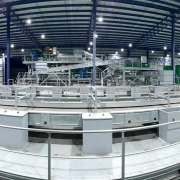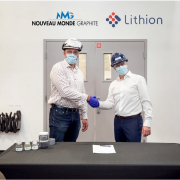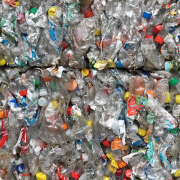Circular Economy-Innovator Polysecure Is Expanding and Nominated a Top-Class Advisory Board
Circular Economy-Innovator Polysecure is expanding and nominated a TopClass Advisory Board Polysecure is growing through self-developed, now established marker solutions and at the same time can further expand its technology platform.
In recent years, the young technology company has researched several key innovations, especially for the circular economy, and secured more than 20 patents. To support its further development and expansion, Polysecure has established a high-calibre advisory board. Jochen Moesslein, founder and CEO of Polysecure: “We are very pleased to have gained such experienced people, who can and want to make a difference for our advisory board.” Thanks to the low incidence, the advisory board members and the Polysecure team were able to meet face-to-face for the first session. This allowed for detailed live demonstrations of the technologies as well as a lively exchange.
Dr Dirk Wacker and Dr Guojun Gao guided through the production of the fluorescent markers. “Through our special synthesis process, we can control certain fluorescence properties particularly well. This is key for reliable detection and good sorting.” Both team leaders also made it clear that the current production can be expanded to quantities sufficient for the introduction of tracer-based sorting throughout Europe and other continents.
As the first of four applications, Polysecure was able to establish mobile product authentication. In this process, fluorescent markers are mixed with low concentrations in the basic materials of products and precisely measured and thus detected by small detectors developed in-house. Dr. Philip Katus demonstrated the speed and consistency of the innovative measurement method using marked series products. “This allows manufacturers in the field to protect themselves against unjustified warranty claims emanating from counterfeit products.” Large-volume series applications such as RENOLIT’s decorative foils also show that the biocompatible fluorescence markers can be processed without com-plication and do not impair the properties of plastics, for example.
Another technology developed by Polysecure is individual product marking through patterns of special fluorescent particles. The three-dimensional patterns are created when suitably marked materials solidify in the material at the end of production. Since the position of the particles is purely random, the patterns are individual and tamper-proof. Since the particles are robust, the patterns remain until the end of a product’s use. Project manager Georg Dost explained: “At the end of production, the patterns can be measured using image recognition algorithms and stored in a database as an individual ‘fingerprint’ of the product.” This fingerprint can thus serve as a lifelong reference point for a digital twin or a material or product passport, an aspect that has been neglected so far. The bottom line is that creating and storing a digital twin is relatively simple. But how is the assignment to an individual product established? Up to now, labels and imprints, which can easily be removed and damaged, have been available for this purpose. This makes an individual product passport worthless. The EU Commission in particular is pursuing the concept of the product passport, currently in the new EU regulation for batteries, in order to make cycle and material-relevant information on a product more transparent. In validation projects with SIEMENS, CONTINENTAL, RÖCHLING and others, Polysecure is currently demonstrating the enormous potential of the particle pattern technology.
The third application of fluorescent markers is the reliable sorting of articles and materials according to predefined criteria. Polysecure has already industrially validated this “TracerBased-Sorting (TBS)” with REHAU for the separation of PVC flakes containing glass fibres. For this purpose, Polysecure has developed the world’s first TBS sorting machine and already confirmed that the patented TBS process works efficiently. In the last three years, Polysecure has further developed the process, especially for the sorting of packaging. The Polysecure team showed the advisory board members the state of development. It is reached by means of a TBS pilot plant, which conveys several marked, deformed, contaminated packages through the TBS detection system at high speed. Dr. Frank Fuchs, chief scientist at Polysecure, explains: “Especially for plastic and composite packaging, the circular economy still needs a technology that reliably and efficiently performs positive sorting according to a sufficient number of definable fractions”. The advisory board members were able to see for themselves through the live demonstration that this reliable detection at just one sorting stage already works today.
The fourth technology presented by team leader Dr Maziar Matloubi was the new POLTAG® method – a breakthrough for the detection of materials in value chains. “Together with the Charles Sadron Institute in Strasbourg, we have developed a process that can precisely synthesise billions of distinguishable macromolecules in batches.” These macromolecules can then be homogenised as markers in plastics, liquids and other materials. For detection, as little as 0.1 to 1 g of POLTAG® molecules in a ton of material is sufficient. “With POLTAG®, for the first time a practically unlimited number of material batches, such as recyclates, can be marked and quantitatively detected, even if they are mixed with other materials,” explains Dr Matloubi.
The advisory councils will now actively support Polysecure in questions of strategic orientation, the classification of the competitive environment and the development of new markets. Prof. Dr.-Ing. Jörg Woidasky from the University of Pforzheim was appointed as the first chairman. Jochen Moesslein and Jörg Woidasky agreed in their conclusion of the first meeting: “The advisory board members see great potential for Polysecure technologies to solve a number of challenges that are still open, especially in the context of the circular economy. Polysecure shows that it is possible to achieve more sustainability on an economic path through good innovations. Especially in the field of sorting technology, Polysecure is further than most people think. Now it is also important to make the new technologies better known in Berlin and Brussels.
Member Advisory Board Polysecure GmbH Freiburg
| Institution/Unternehmen | Name |
| Bundesverband der Deutschen Entsorgungs-, Wasser- und Rohstoffwirtschaft e.V. (BDE), Berlin | Dr. Andreas Bruckschen |
| Carl Zeiss AG, Eggenstein-Leopoldshafen | Dr. Max Riedel |
| DSD – Duales System Holding GmbH & Co. KG, Köln | Michael Wiener |
| Frankfurt University of Applied Sciences | Prof. Dr. Johannes Ohmer |
| GKV/TecPart, Verband Technische KunststoffProdukte e.V., Frankfurt | Frank Stammer |
| Institut für interdisziplinäre Organisationsentwicklung und Nachhaltigkeitsmanagement, Teningen | Prof. Michael J. Kolodziej |
| International Environmental Politics | Franz Untersteller (Former Minister
of Environment, BadenWürttemberg) |
| International Environmental Politics | Prof. Dr. jur. Helmut Maurer (Watching status) |
| Institut für interdisziplinäre Organisationsentwicklung und Nachhaltigkeitsmanagement, Teningen | Prof. Michael J. Kolodziej |
| Henkel AG & Co. KGaA, Düsseldorf | Arne Jost |
| Hochschule Pforzheim | Prof. Dr.-Ing. Jörg Woidasky |
| Polysecure GmbH, Freiburg | Jochen Moesslein |
| PreZero Stiftung GmbH & Co. KG, Neckarsulm | Andreas Winterstein |
| TRUMPF Hüttinger GmbH + Co. KG, Freiburg | Dr. Carsten Winnewisser |
| TUHH – Technische Universität Hamburg, Hamburg | Prof. Dr.-Ing. Kerstin Kuchta |
| Wuppertal-Institut für Klima, Energie und Umwelt | Dr. Henning Wilts |
Source: Kummer:Umweltkommunikation GmbH (Rheinbreitbach, Germany, August 06, 2021)








